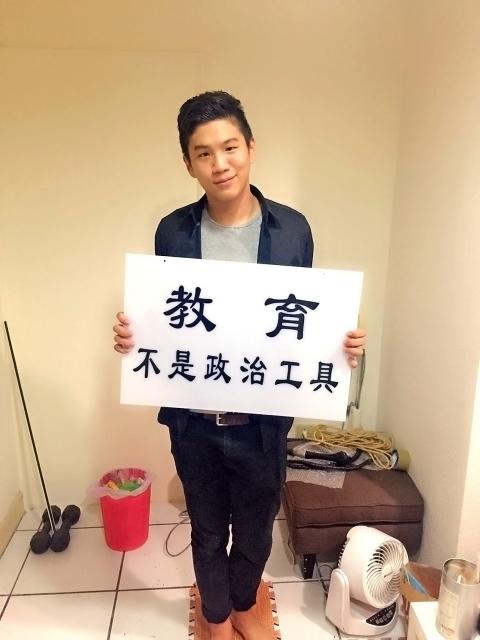As the nation reels from the news that student activist Dai Lin (林冠華) has taken his own life, an interview with the Chinese-language Liberty Times (the Taipei Times’ sister paper) showed the pressure he was under due to his participation in protests against the government’s planned changes to high-school student curriculum guidelines.
Lin was one of 33 people arrested on Thursday night last week for entering the Ministry of Education building and was facing possible prosecution along with 23 other activists.
During a telephone interview on Sunday — two days after his release on bail — Lin said that the principal of New Taipei City’s Juang Jing Vocational High School had visited him hours earlier to discuss his involvement in the demonstration.

Facebook screen grab
“The principal started off by asking me what I really wanted and if there were any messages I needed him to help me convey,” said Lin, who had applied for leave from the school to devote more time to the protests.
The 20-year-old said the principal asked him a lot of questions such as: “Did I know what I was doing? Had I thought this through? Had I fulfilled my duty [as a student]? Had I thought about my future and whether I would still be able to find a job after the arrest.”
Lin said he told the principal he had taken all those things into consideration before joining the protest against the opaque changes to the curriculum and that what had saddened the students the most was seeing their own teachers and principals dismissing their efforts out of hand.
“I think the principal achieved what he intended. After our talk, he went to speak to my mother downstairs for about 10 minutes. All of a sudden, my parents, who had never spoken against my participation said: ‘Who are you to fight this cause? Don’t be too full of yourself,’” Lin said.
“Their words made me disappointed in myself,” he added.
Asked if other student protesters had also been talked to by their schools’ authorities, Lin said the movement would not take any action if his was an isolated case, but that protesters would make their objections known if they ever discovered the Ministry of Education was behind a campaign of intimidation.
Lin said student movements were not frivolous activities because participants often had to undergo questioning from authorities and their characters can be attacked.
“I sincerely hope that parents and school authorities take the time to understand why students are fighting for this cause despite all the pressure we are under. Do not just tell us that the curriculum will no longer be our problem after we graduate and go to college,” he said.
Lin said that many authority figures show no understanding or empathy with the movement’s efforts.
“Maybe the schools are under pressure [from the ministry] or our movement has caused them too much inconvenience. Either way, they should not have questioned or dismissed our motives,” he said.

The manufacture of the remaining 28 M1A2T Abrams tanks Taiwan purchased from the US has recently been completed, and they are expected to be delivered within the next one to two months, a source said yesterday. The Ministry of National Defense is arranging cargo ships to transport the tanks to Taiwan as soon as possible, said the source, who is familiar with the matter. The estimated arrival time ranges from late this month to early next month, the source said. The 28 Abrams tanks make up the third and final batch of a total of 108 tanks, valued at about NT$40.5 billion

Two Taiwanese prosecutors were questioned by Chinese security personnel at their hotel during a trip to China’s Henan Province this month, the Mainland Affairs Council (MAC) said yesterday. The officers had personal information on the prosecutors, including “when they were assigned to their posts, their work locations and job titles,” MAC Deputy Minister and spokesman Liang Wen-chieh (梁文傑) said. On top of asking about their agencies and positions, the officers also questioned the prosecutors about the Cross-Strait Joint Crime-Fighting and Judicial Mutual Assistance Agreement, a pact that serves as the framework for Taiwan-China cooperation on combating crime and providing judicial assistance, Liang

A group from the Taiwanese Designers in Australia association yesterday represented Taiwan at the Midsumma Pride March in Melbourne. The march, held in the St. Kilda suburb, is the city’s largest LGBTQIA+ parade and the flagship event of the annual Midsumma Festival. It attracted more than 45,000 spectators who supported the 400 groups and 10,000 marchers that participated this year, the association said. Taiwanese Designers said they organized a team to march for Taiwan this year, joining politicians, government agencies, professionals and community organizations in showing support for LGBTQIA+ people and diverse communities. As the first country in Asia to legalize same-sex

MOTIVES QUESTIONED The PLA considers Xi’s policies toward Taiwan to be driven by personal considerations rather than military assessment, the Epoch Times reports Chinese President Xi Jinping’s (習近平) latest purge of the Chinese People’s Liberation Army (PLA) leadership might have been prompted by the military’s opposition to plans of invading Taiwan, the Epoch Times said. The Chinese military opposes waging war against Taiwan by a large consensus, putting it at odds with Xi’s vision, the Falun Gong-affiliated daily said in a report on Thursday, citing anonymous sources with insight into the PLA’s inner workings. The opposition is not the opinion of a few generals, but a widely shared view among the PLA cadre, the Epoch Times cited them as saying. “Chinese forces know full well that